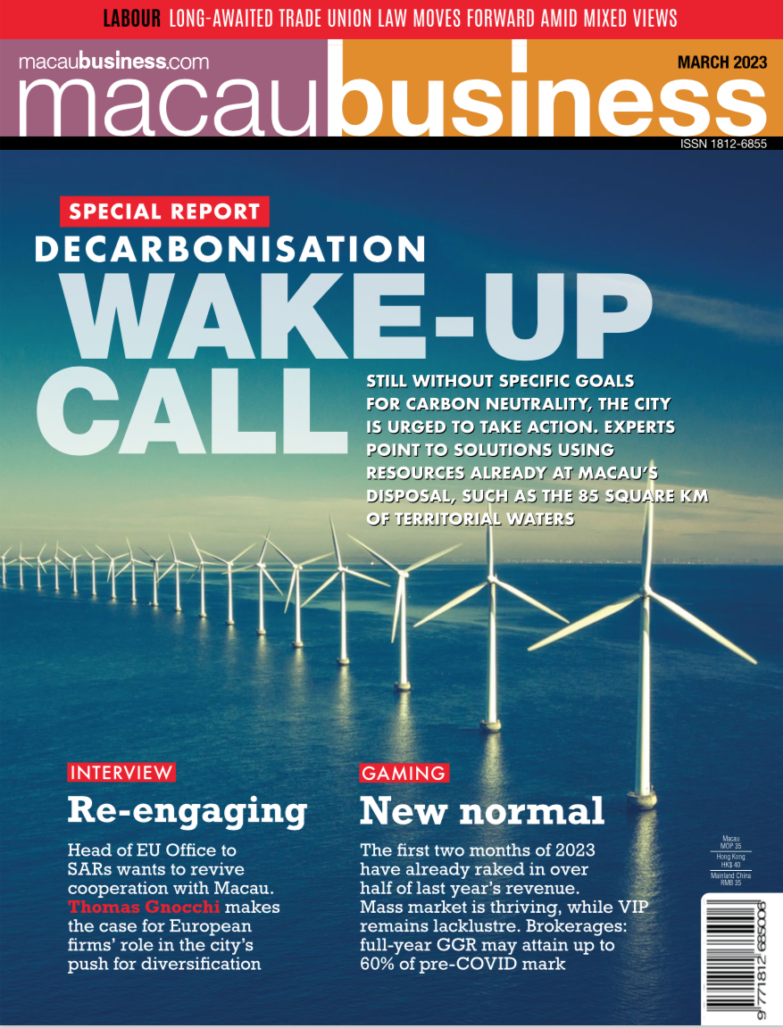Macau Business Editorial | March 2023 | By José Carlos Matias – Director
When in December 2015 the Central Government authorised Macau to manage 85 square kilometres of territorial waters around the SAR, the local Government pledged to “manage, utilise and develop the waters well.”

In the words of then Chief Executive Chui Sai On: Beijing’s decision provided “new conditions and opportunities for Macau to thrive from the sea.” It was high time to envision the development of maritime tourism and a blue economy, putting those valuable water resources to use in support of the city’s sustainable development. Yet, more than seven years on, progress has been all but a drop in the ocean.
Let’s take a deep dive into these surrounding waters – sink or swim. The time has come to finally start making the most of this natural asset across the board. So, what exactly has the Coordinating Commission for the Management and Development of Maritime Jurisdiction Areas, established in 2017, been doing to that end? The last meeting, held in mid-2022, indicated that authorities would carry out public consultations on a law to govern the use of maritime areas and the zoning of surrounding waters, creating a blueprint for development of the 85-square-kilometre territory.
The Policy Address for 2023 reiterated that such a task would be carried out as soon as possible. But how soon is that? It’s evident that the previous administration dragged its feet on this front, and the current one has yet to embrace this agenda.
While in the midst of the pandemic emergency, that these matters were kept on the back burner is understandable, but now that all that’s behind us it would be a mistake for the government to continue to side-line the project as an afterthought.
At the end of the day, one doesn’t need to walk on water to deliver results
Development of maritime tourism was enshrined as one of several non-gaming focus areas in the recent tender for the gaming concessionaires’ new 10-year term. One can hope this might incentivise real results, but there are obstacles to be addressed and lessons to be learned. Take the failure of the Zhongshan–Macau Free Yacht Scheme for example. Successfully developing the maritime tourism industry could potentially make waves in the local economy.
The city’s territorial waters could also be exploited for renewable energy, as proposed by experts in this issue’s Special Report. Furthermore, from an urban planning perspective the city’s coastal zones remain to a great extent underutilised considering their potential. The SAR’s Master Plan comprises a “Historical Touristic Coastal Area Belt” and points to the need to develop coastal zones to maximise leisure space and green space while protecting the local ecosystem. It is imperative that these principles are not merely lip service but translate into concrete actions.

Any talk of developing Macau’s maritime assets presupposes fluent collaboration between us and our neighbours in Zhuhai and Hengqin and Guangdong authorities as a whole. After all, the shared Guangdong-Macau In-depth Cooperation Zone is never more than a skipping stone’s throw from the water’s edge. Recent weeks post-pandemic have seen plenty of activity aimed at accelerating the Zone’s development, with newly-announced important measures including a financial stimulus package incentivising Macau businesses to set up shop in the neighbouring island and financial connectivity arrangements promoting integration. Other steps that would facilitate mobility are said to be in the pipeline, as well.
It’s high time to put Hengqin’s development back on track and take a more market-driven, pragmatic approach
Of undeniable importance are moves towards seamless connectivity and hassle-free border crossing and towards adopting an inclusive approach aimed at attracting Macau-based talent of all sorts (locals, non-locals, foreigners) to join the process and contribute to and benefit from Hengqin’s development. But beyond that, an improved legal framework, assured capital mobility and flagship foreign investments would boost confidence and could create a much-needed virtuous circle. With the pandemic behind us, it’s high time to put Hengqin’s development back on track and take a more market-driven, pragmatic approach to meeting the targets set by authorities.
At the end of the day, no one needs to walk on water to deliver results. The talk has been talked; now it’s just about walking the walk.
























